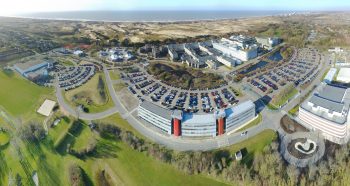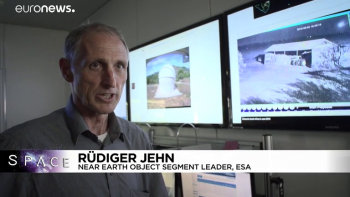
An aerial view of ESTEC from this year. Credit: ESA
The International Space University’s Space Studies Program will officially open today at ESA in the Netherlands. The nine-week programme will see more than 130 participants representing 37 nationalities take part in lectures, workshops and team projects to gain an interdisciplinary understanding of all aspects of the space industry.
This year’s ISU programme is co-hosted by the Technical University Delft and the Netherlands Space Office, in close cooperation with ESA and Leiden University.
Two groups of participants will focus in particular on issues of space safety and sustainability as they prepare project reports on the role space should play in human adaptation to global climate change and on new ideas for the removal of space debris from Earth orbit using ecologically sound technology.
Looking ahead to sustainable innovation
Omar Hatamleh Credit: ISU/NitzanZohar
“Working with young professionals reminds us all of the need to keep space sustainable for the generations to come,” says Omar Hatamleh, ISU’s Director of the Space Studies Program. “We look ahead to a future of great innovation and technology, but we also realise the importance of making those great advances available to everyone and to make them sustainable over the long term.”
The space debris project will examine some of the proposals by space agencies and commercial companies that include the deorbiting of defunct satellites, moving them to safer orbits or salvaging them for reuse on other satellites or spacecraft, before composing a plan for an original mission. The participants at ISU come from a wide range of backgrounds and experiences and will be encouraged to bring new approaches to the problem.

Rüdiger Jehn Credit: ESA/Euronews
“I’m looking forward to seeing exciting new ideas from the participants in the project,” says team project co-chair Rüdiger Jehn, who is also Co-Manager for Near-Earth Objects within ESA’s Space Situational Awareness Programme.
“We need to guarantee the long-term safety and security of space operations, so that all of the generations to come can benefit from knowledge we gain from space data. Developing awareness of the issue and good ideas for addressing it is really important for everyone with an interest in space.”
Looking at key risks of climate change
The host nation of the Netherlands has a particular interest in another of the team projects, as it looks at two key risks of climate change – flooding and diminished air quality. Lying at or below sea level, the Dutch interest in flood mitigation is clear, while scientists from the Netherlands were also key in developing the Tropomi instrument measuring air quality on board the Sentinel 5P satellite launched last year.
“We welcome participants from many countries to their summer of space in the Netherlands this year,” says Erik Laan, co-chair of the team project on adaptation from space for climate change. “We are interested in understanding how climate change affects different environments and ecosystems, and how our knowledge from space can help us all to minimise the impacts of a changing climate for people on the ground. This international group will allow us to explore new ideas for what will be our common future.”
The opening ceremony of the Space Studies Program will be attended by HM the King of the Netherlands and addressed by ESA Director General Jan Wörner. The ceremony is available to view on ISU’s YouTube channel.
Today’s post contributed by Ruth McAvinia. Ruth is an ATG-Europe editor for ESA and a member of the global faculty of ISU.
More info
from Rocket Science https://ift.tt/2tpv0za
v

An aerial view of ESTEC from this year. Credit: ESA
The International Space University’s Space Studies Program will officially open today at ESA in the Netherlands. The nine-week programme will see more than 130 participants representing 37 nationalities take part in lectures, workshops and team projects to gain an interdisciplinary understanding of all aspects of the space industry.
This year’s ISU programme is co-hosted by the Technical University Delft and the Netherlands Space Office, in close cooperation with ESA and Leiden University.
Two groups of participants will focus in particular on issues of space safety and sustainability as they prepare project reports on the role space should play in human adaptation to global climate change and on new ideas for the removal of space debris from Earth orbit using ecologically sound technology.
Looking ahead to sustainable innovation
Omar Hatamleh Credit: ISU/NitzanZohar
“Working with young professionals reminds us all of the need to keep space sustainable for the generations to come,” says Omar Hatamleh, ISU’s Director of the Space Studies Program. “We look ahead to a future of great innovation and technology, but we also realise the importance of making those great advances available to everyone and to make them sustainable over the long term.”
The space debris project will examine some of the proposals by space agencies and commercial companies that include the deorbiting of defunct satellites, moving them to safer orbits or salvaging them for reuse on other satellites or spacecraft, before composing a plan for an original mission. The participants at ISU come from a wide range of backgrounds and experiences and will be encouraged to bring new approaches to the problem.

Rüdiger Jehn Credit: ESA/Euronews
“I’m looking forward to seeing exciting new ideas from the participants in the project,” says team project co-chair Rüdiger Jehn, who is also Co-Manager for Near-Earth Objects within ESA’s Space Situational Awareness Programme.
“We need to guarantee the long-term safety and security of space operations, so that all of the generations to come can benefit from knowledge we gain from space data. Developing awareness of the issue and good ideas for addressing it is really important for everyone with an interest in space.”
Looking at key risks of climate change
The host nation of the Netherlands has a particular interest in another of the team projects, as it looks at two key risks of climate change – flooding and diminished air quality. Lying at or below sea level, the Dutch interest in flood mitigation is clear, while scientists from the Netherlands were also key in developing the Tropomi instrument measuring air quality on board the Sentinel 5P satellite launched last year.
“We welcome participants from many countries to their summer of space in the Netherlands this year,” says Erik Laan, co-chair of the team project on adaptation from space for climate change. “We are interested in understanding how climate change affects different environments and ecosystems, and how our knowledge from space can help us all to minimise the impacts of a changing climate for people on the ground. This international group will allow us to explore new ideas for what will be our common future.”
The opening ceremony of the Space Studies Program will be attended by HM the King of the Netherlands and addressed by ESA Director General Jan Wörner. The ceremony is available to view on ISU’s YouTube channel.
Today’s post contributed by Ruth McAvinia. Ruth is an ATG-Europe editor for ESA and a member of the global faculty of ISU.
More info
from Rocket Science https://ift.tt/2tpv0za
v

Aucun commentaire:
Enregistrer un commentaire